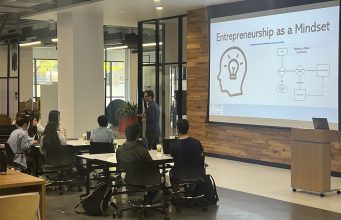For Welly Bottle, partnering with charity: water and building wells to provide clean water to villagers in Ethiopia and Malawi is more than just a charitable endeavor. “Our company is mission-driven and committed to environmental sustainability and education,” said Benjamin Kander 12BBA, the company’s founder and CEO. “Welly is born from the belief that pure water is essential to pure living.”

Social responsibility was a driving factor in the formation of Welly Bottle. As a 22-year-old Goizueta senior, Kander learned his mother, Elly, had liver cancer. “When she passed, I realized just how fragile life can be,” he said. “She was a humanitarian. My own business needed to expand on those same qualities she instilled in me.”
Two important influences on Kander were Peter Roberts, Goizueta’s academic director of Social Enterprise @ Goizueta, and his class on social enterprise. In 2013, Kander established a dual purpose for his side venture: “to provide highly functional and fashionable drinkware that helps our environment and gives clean water to people in need. With Welly, we say there is purpose in every sip.” His intended products would incorporate bamboo, a naturally renewable, environmentally friendly element.
When entrepreneurial companies also focus on impact, customers get to actively participate in a more positive version of the future. “People are attracted to companies that they also admire,” said Roberts. “When impact is woven into the fabric of the company, they can meet their private needs in ways that are values-congruent. In return, the company can grow and sustain its growth.”
By year 3: Kickstarter, recall, redesign and re-launch
After graduation, as Kander worked full-time in sales and marketing for a major food manufacturer, he formalized his business plan. “My theory was to help eliminate single-use plastics by providing a sustainably produced insulated water bottle.”
In 2015, with limited seed money from family and friends, launching a Kickstarter campaign became the first logical step in external fundraising. Kander’s original design called for “an easy-to-carry, reusable, BPA-free water bottle with a built-in filter made from activated and carbonized coconut shells that purifies your water as you drink it.” The bottle’s exterior called for compressible bamboo hand panels. Backers loved the idea, and in all, 1,135 people around the world pledged $64,127 to help Kander launch his company. “Validation is great,” he recalled. “I dove into full logistical planning by establishing manufacturing and fulfillment operations while pre-planning packaging and marketing.”
“One of the great benefits to launching a company in the crowdfunding era is that it not only establishes proof of market need but also creates backers who see themselves as evangelists rather than customers,” said Andrea Hershatter, senior lecturer in organization & management and senior associate dean of undergraduate education. “Kickstarter investors are buying the entrepreneur’s vision along with the product, and it is a testament to Ben’s character that he embraced transparency and personal accountability at such an early stage in his venture.”
As is common with many young companies, problems beset post-funding production almost immediately. “We pre-sold a prototype we learned we could not make,” Kander said. “Despite our best efforts to resolve problems, the bamboo panels cracked due to curvature and compression.” By December, Kander had switched manufacturers, apologized to his Kickstarter backers, and renewed customer loyalty through honesty and transparency. “Some backers moved on, but the majority remained committed to Welly Bottle.
“I quickly learned that managing production from a distance puts you at a disadvantage,” Kander said. In early 2016, Kander traveled to Hangzhou, China, to refine design and tooling and to supervise production with Welly’s new manufacturing partner. He pointed out, “Being on-site definitely makes a huge difference in strengthening working relationships.”
Welly Bottle’s startup challenges continued, and after first delivery, a product recall ensued. He said, “We had to redesign everything and essentially relaunched the company in January of 2018.”
Now on firm ground

Now, in 2020, “We have learned. Our production is solid, customers love the products and Welly Bottle is in a big inflection year,” Kander said. With multiple employees and sales topping $1 million, the global pandemic has not slowed the company’s progress.
“In March, our sales tanked,” Kander noted, “but we rebounded quickly and are on track to build partnerships with major national retailers.”
Looking ahead, continued excellent customer service, along with partnerships with great artists and retailers, will take top priority. Welly Bottle has also become a family affair. Kander’s sister, Kate Kander 21C, and his brother, Jacob, have joined the ranks of company employees.
As his leadership and business acumen continue to evolve, Kander shares his expertise with other entrepreneurs looking to turn a great idea into a new company. “Giving up the cushion of a full-time paycheck can be frightening, but you’ll know when the time is right to make that leap,” he said of his own 2017 departure from a previous employer. “Without a doubt, taking charge of my own future was the best thing I ever did.”
He offered this caveat: When orders begin to pile up, “Inventory management and cash flow are everything,” he said. “You need to keep up with demand without running out of cash. But never forget to trust the process, and good results will come.”
Would you like to learn more about Goizueta programs to empower entrepreneurs? Amelia Schaffner, Goizueta director of entrepreneurship, recommends a visit to Entrepreneurship @ Goizueta. Subscribe to the entrepreneurship newsletter here.











